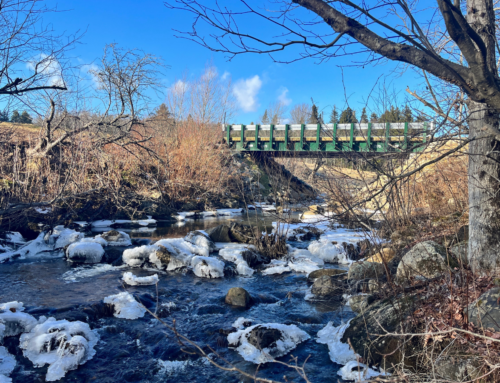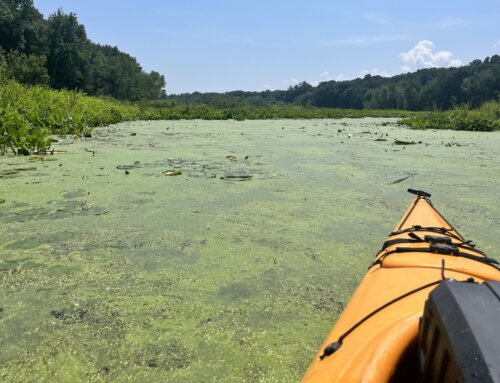Greenfield, MA – Single-use plastic bans (think plastic bags, straws, etc.) have been spreading town by town across New England and the U.S. In Europe, decision-makers are going even further by approving legislation that bans ten common types of single-use plastic items across the entire European continent. To learn more, the Connecticut River Conservancy (CRC) hosted two presentations on Thursday, April 25 with Ms. Guiliana Torta – Counsellor for Environment, Fisheries and Ocean policies at the EU Delegation to the U.S. in Washington DC. She presented at the Connecticut Department of Energy and Environmental Protection headquarters in Hartford, CT and at Smith College in Northampton, MA.
Ms. Torta pointed to paper and aluminum recycling as success stories that have already had a major impact in cleaning up our environment. Plastic is the next priority, given the huge amounts turning up as trash in our rivers and oceans and given how long plastic remains in the environment. The need to solve our plastic problem has become urgent ever since China stopped accepting most of our recycled items.
“CRC volunteers have cleaned up more than 1,000 tons of trash over the course of 22 years at our annual Source to Sea Cleanup in NH, VT, MA, and CT,” says Andrew Fisk, CRC Executive Director. “It’s clear that repeated cleaning is not the solution to our trash problem. We need to redesign our economy so there isn’t waste in the first place.” Moving to a circular economy that minimizes waste – like plastic – has other benefits such as increasing efficiency and stimulating economy by creating jobs. But it needs widespread support from consumers, business and industry, and legislators to be successful.
“We all have a responsibility to solve our trash problem—individuals, manufacturers, businesses, and government,” notes Fisk. CRC invites you to join the effort by signing their petition urging legislators, businesses, and manufacturers to get involved in stopping trash before it starts. You can also sign up for CRC action alert emails and join the annual Source to Sea Cleanup on September 27 and 28, 2019. Visit ctriver.org/takeaction
Ms. Torta worked in the European Commission headquarters for 11 years before moving to Washington DC in 2017. In Washington, she covers a wide range of environmental policies including Circular Economy and Resource efficiency, the recent EU Plastics Strategy, Food waste, Fisheries and Ocean governance. She was previously posted as Environment Adviser in the EU Delegation for the Pacific, with regional responsibilities. A forester by training with a PhD in landscape and plant ecology, she has over 25 years of experience in implementation and development of environmental policies ranging from biodiversity and nature conservation, international forestry, climate adaptation and sustainable development.
These events were hosted by CRC in partnership with the Connecticut Department of Energy and Environmental Protection (CT DEEP) and Smith College Museum of Art in conjunction with the exhibition “Plastic Entanglements: Ecology, Aesthetics, Materials” on view through July 28, 2019.
Connecticut River Conservancy is the voice for the Connecticut River watershed, from source to sea. They collaborate with partners across four states to protect and advocate for your rivers and educate and engage communities. CRC brings people together to prevent pollution, improve habitat, and promote enjoyment of your river and its tributary streams. Healthy rivers support healthy economies. To learn more about CRC, or to join the effort and help protect our rivers, visit ctriver.org.
###







